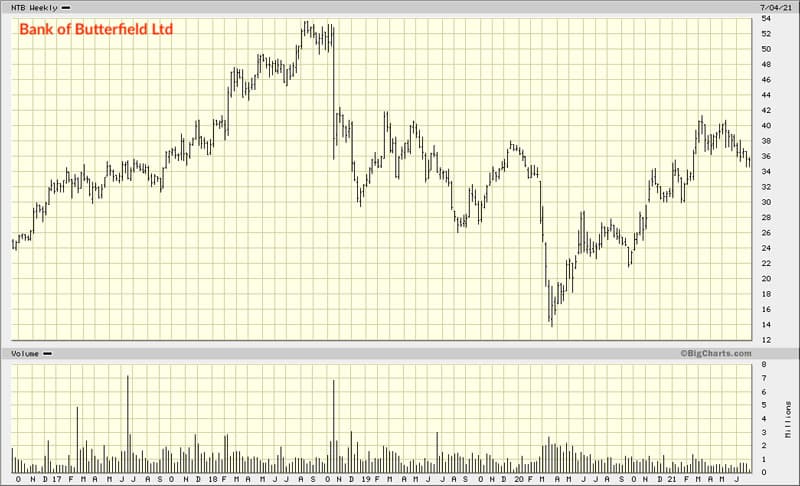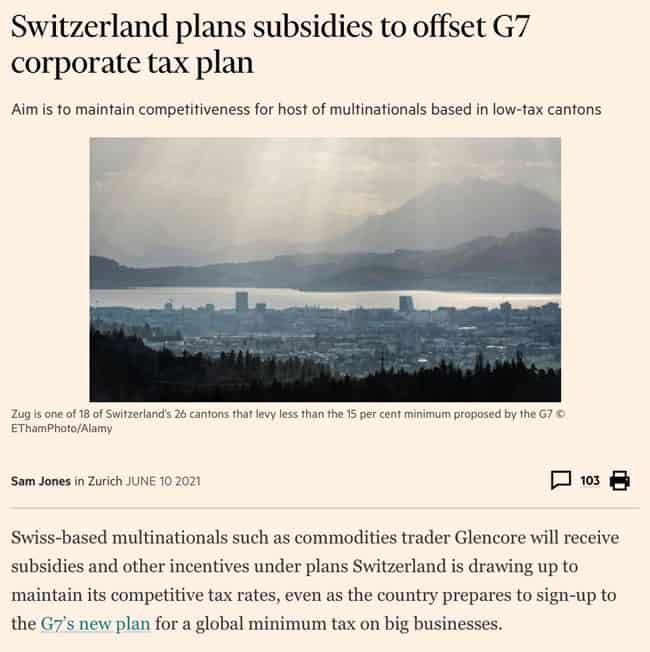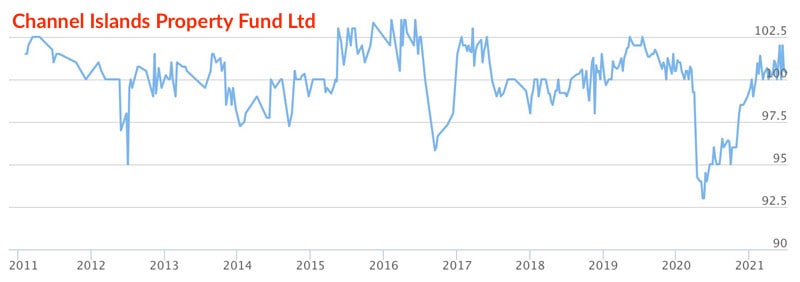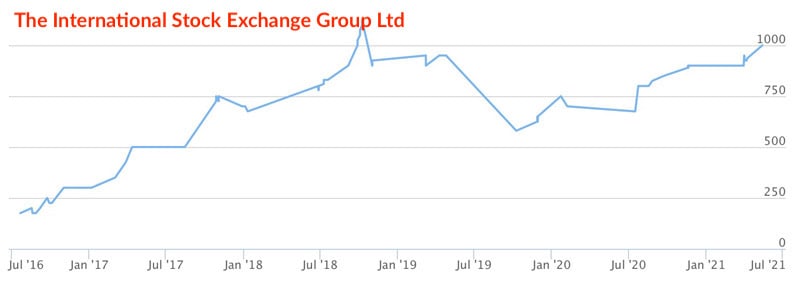You know a jurisdiction is popular when its population increases by 7-11% in a single year. That's what happened in Guernsey, the British Crown dependency and second largest of the Channel Islands just off the coast of France.
At the start of the pandemic, Guernsey had 62,000 residents. According to unofficial estimates, an additional 4,500-7,000 people have since stepped ashore. To put this into perspective, the UK would need to see an influx of 5-7m people to experience the same percentage change in population.
Guernsey's sudden popularity has caused crazy developments that a year ago would have been unthinkable:
- Estate agents no longer have enough properties to fill their window displays; instead, many displays now read "Properties wanted". It's a remarkable turn from the previous ten years when the market had seen lacklustre prices and many unoccupied properties.

- Property prices are way up, and bidding wars for choice properties are common. The market recorded the most transactions since 2007, based on statistics compiled by Jason Morgan, a lawyer at Carey Olsen, the island's leading property law firm.
- In one infamous case, someone from London called a local estate agent and purchased three houses for GBP 11m without even having been to the island.
What caused the rush, and why should private investors with an interest in the stock market care?
Today's final instalment of my three-part series about "great escape" destinations for the wealthy and productive provides the answer. I saved my personal favourite till last!

Guernsey's picturesque properties have been in demand lately.
A brief explanation of the island's special privileges
The jurisdiction known as the Channel Islands comprises Guernsey, Jersey, Alderney, Herm and Sark (and are not to be confused with the Channel Islands located off the coast of California!). For historical reasons, the islands are not a part of the UK nor of France (despite their location a mere 22 kilometres (14 miles) off the French coast). Even though they fall under the auspices of the English Crown, they have their own identity and govern their own affairs. Three of the five islands have their own parliament while the other two are latched onto Guernsey's governance system.
The Channel Islands' extraordinary powers for self-governance extend to:
- Tax laws.
- Regulating financial services.
- Immigration.
- And just about everything else that a country manages on behalf of its citizens.
Technically speaking, the Channel Islands are not a full-fledged country of their own, but they mainly operate as such. It's this hybrid status that makes them the best of both worlds in many regards. Up to 7,000 people have just discovered this for themselves, and based on my research, there is more to come. We have probably only seen the first phase of an extraordinary migration to the Channel Islands, and there'll be several exciting opportunities coming out of this for investors.
The "tax haven" that is not a tax haven
Guernsey's GDP per capita is 30% higher than that of the UK. Much of this economic success is driven by Guernsey's finance industry even though the island is not a "tax haven" in the conventional sense. You'll be surprised what you will NOT find in Guernsey:
- Brass plate companies? Guernsey never offered shell company services.
- Zero income tax, Monaco-style? Guernsey has an income tax of 20%.
- Anonymous bank accounts? Guernsey left that to Switzerland.
For as long as I can think back (and I first arrived in Guernsey in 2004), the island had a very different approach to developing its finance industry, and it's currently paying off mightily.
Private clients looking for a safe place to keep legal, legitimate wealth? Guernsey's political system has delivered hundreds of years of political stability, the legal system is fiercely protective of private property, and the island's banks are ring-fenced to protect them against financial instability arising elsewhere in the world (e.g., if Lloyds UK goes bust, it won't affect clients of Lloyds Channel Islands).
Institutional investors looking for a place to create innovative products? Guernsey's financial regulator is not only open to product innovations, but its staff are also easy to get hold of and happy to discuss requirements individually and with a common-sense approach. The Guernsey Financial Services Commission may even involve Guernsey's parliament to create new laws if that helps to develop new business. Suggestions for new legislation are welcome.
Corporate clients looking for particular expertise? Guernsey is one of the world's leading know-how centres for creating and placing corporate bonds. Up to half of the corporate bonds launched in Europe originate in Guernsey. As one German lawyer once explained to me, bond experts in Guernsey have a unique skill set that cannot be matched by any other European financial centre.
Right now, international bodies such as the G7 and the OECD are trying to crack down on countries that offer "post box companies" and other tools for illegal tax evasion. Malta experienced this two weeks ago when an international supervisory body greylisted the country for its deficiencies in monitoring money laundering and terror financing. Such greylistings are no longer a mere slap on the hand; they matter to clients, too. Anyone who keeps money in Malta may now find that banks in some jurisdictions will no longer accept bank transfers.
None of that affects Guernsey, given its different approach to attracting business. For years, Guernsey had been infamous in London's finance circles for being holier than the pope. Finally, everyone is starting to recognise the wisdom of playing the long game and being selective.
While the likes of Malta are busy playing catch-up and fire-fighting, Guernsey can focus on communicating and marketing its strengths.
Personal taxes? Guernsey has an income tax of 20%, so it can't easily be attacked for being a zero-tax jurisdiction. However, thanks to its fiscal prudence, it doesn't need to squeeze its residents quite so hard. Put in somewhat simplified terms, income tax is capped at an income of GBP 650,000. Someone who earns GBP 2m still only needs to pay the maximum income tax of GBP 130,000 (20% of GBP 650,000, the remaining GBP 1.35m are tax-free). It's even more advantageous for new residents: during the first four years, their income tax can be capped at just GBP 50,000 p.a. if they meet some additional conditions (such as buying a property). For anyone wanting to check the detailed rules, here is a summary.
Non-stop government interference in your life? Guernsey spends just 21% of its GDP on government, compared to 33% in the UK, 36% in the US, 38% in Germany, and 45% in France. There is a legal limit in place that prevents the government of Guernsey from increasing taxes beyond a threshold of 24% of GDP. Due to its smaller size alone, the government is much more hands-off than in most other parts of Europe, leaving more responsibility to the individual.
Safety and peace? Guernsey is virtually crime-free. Doing as much as leaving your hedge cuttings on the pavement will likely get you a visit from both the police and the local media.
Combine Guernsey's overall conservatism with the instability and uncertainty elsewhere, and you'll understand why individuals and companies alike have started to discover Guernsey as one of Europe's ultimate escape hatches.
The second wave of migration will hit an empty property market
Over the next years, taxes in most parts of Europe and North America will go up - and in some places, dramatically so. In the UK, the writing is on the wall for a 50% income tax rate from 2022 onwards. Capital gains tax, which long served as an escape route for the wealthy to help reduce taxes on their overall income, is also earmarked for a significant rise. Some worry that income tax and capital gains tax will be equalised.
London alone has over 10,000 employees with an annual salary above GBP 1m, while across the UK, there are over 30,000 such individuals. Come 2022, and they'll pay around GBP 500,000 in income tax. If, however, they moved to Guernsey, their tax would be limited to GBP 50,000 during the first four years. If they generate some of their income through capital gains tax, that's entirely tax-free.
Someone who moves and spends five years in Guernsey will have saved enough taxes to get a GBP 2m house for free (and keep some spare change). If someone has a mobile job and likes the lifestyle of a tranquil, English-speaking island in Western Europe, the decision to move is a no-brainer. That's particularly true for anyone who desires to be within a short (0.5h) distance from London, instead of flying 2.5h from Monaco or 7h from Dubai.
Guernsey doesn't just attract those with a very high income, though:
- Younger finance professionals looking to get away from pandemic-era London, towards a more outdoorsy lifestyle.
- Internet entrepreneurs wanting to build their business in a place with zero capital gains tax (and subsequently sell up tax-free).
- Families looking to live in a conservative environment without crime or "woke" ideologies.

A peaceful lifestyle 30 flight minutes from London.
As I hear in London's financial circles, several significant-size companies are currently evaluating whether to move their entire operation and all their staff to Guernsey. I am pretty sure you'll soon hear of one or the other hedge fund billionaire rock up in Guernsey, which will add to the existing pool of billionaires who are already there.
The influx of the last 16 months has soaked up a lot of the excess capacity of Guernsey's real estate market. Guernsey has a two-tier market, where 10% of the real estate are open to a wide range of immigrants, and 90% geared towards long-time islanders and those new arrivals whose presence is deemed essential (e.g. to fill local jobs). Needless to say, demand for the so-called "Open Market" also influences the prices on the "Local Market". Also, there is an overspill of immigrants into the Local Market because of people moving in as employees, getting married locally, or having existing family on the island. As a result, prices to rent or purchase are already up across the board, and many complain of a housing crisis.
I expect that we have only just seen the beginning of a massive, unprecedented property boom in Guernsey:
- The influx of new residents from the UK has so far been slowed by travel restrictions. Since 1 July 2021, travel restrictions between the UK and the Channel Islands have fallen away for anyone who is fully vaccinated. There'll be a backlog of people who wanted to visit Guernsey to arrange for moving.
- It's probably only a matter of time before new mobility options – such as passenger drones or low-cost electric planes – dramatically change the accessibility of Guernsey. So far, you needed a serious helicopter to fly from Guernsey to London's Battersea heliport. Give it five years, and Guernsey will be under intense pressure to adopt new mobility options because they'll have become common elsewhere by then. These options may still seem futuristic, but they probably have a much higher likelihood of improving the island's connectivity during the 2020s than the plan to build a tunnel from Guernsey to France.
- The island is almost precisely the size of Manhattan, but it has less than 70,000 residents compared to Manhattan's 1.6m. It's an extreme comparison, but it illustrates the point. Guernsey's government has already recognised the island's worsening demographic situation: the average population age is 44, compared to 40 in the UK and 38 in the US. Guernsey needs more young people, and there is chatter of a potential visa for digital professionals. Where to put additional residents? The island's politicians recently squandered an opportunity to create massive amounts of new space by redeveloping the main harbour. The pressure created by new demand for accommodation will now have to discharge elsewhere on the island.

Guernsey will come under pressure to develop more real estate.
For investors, there are several ways to participate in this boom. Luckily, you won't need to purchase a property. There are stocks that allow you to get a piece of the action, and you may even want to consider using Guernsey for other aspects of your life.
A few routes to take advantage of Guernsey
If you don't like the idea of owning physical real estate and looking after tenants, you could make your life easier with the publicly-listed Channel Islands Property Fund (ISIN GG00B62DS151). The company owns some of the best commercial property on Guernsey. Since I featured the fund in my Weekly Dispatch on 31 January 2020, its stock price hasn't moved (it actually briefly dipped by 10% during the March 2020 crash). However, now is a good time to look at it again.
While residential house prices in Guernsey have already started to boom, commercial property has lagged behind. As a result of the pandemic, when people were working from home, a lot of office space in Guernsey is unused. British companies could not yet move due to travel restrictions and other complications. Over the coming 12 months, the market for Grade A office property in Guernsey should pick up again.
In the meantime, the Channel Islands Property Fund's portfolio is a solid way of safely putting away some money. During the first quarter of 2021, the company collected 100% of the rent due from its tenants. It pays a dividend yield of 6% based on the current share price, and it doesn't have significant exposure to retail properties. Given how space-restricted Guernsey already is, any kind of high-quality exposure to its property market should be beneficial over the coming years - and who knows, some of the properties might even get converted into prime residential space.
For those more inclined towards investing in digital businesses, there is the stock of The International Stock Exchange("TISE", ISIN GG00BYYLRY96) which I had already featured in my Weekly Dispatch of 30 April 2021. The stock's current valuation is insanely attractive: if you deduct its net cash from its market cap, it has a p/e of 5. This is before factoring in the possibility of higher earnings during the current year because business continues to do well. TISE has hired a new high-calibre leadership team, and it is working on ambitious growth plans. The company is much more of a budding Fintech company than a staid stock market monopoly. If Guernsey's finance sector does nearly as well as I suspect it will over the coming years, TISE stock should deliver handsomely for investors. As always, though, this is NOT an investment recommendation - do your own research.
Admittedly, buying either one of these two shares is a bit difficult. Your broker needs to be a TISE member or have a correspondence broker in Guernsey. Fear not, though. I have come up with an interesting option that will also address another much-asked question from my readers.
I can't even begin to count the number of enquiries I've had from friends, professional acquaintances and colleagues about opening a non-resident bank account in the Channel Islands. As a low-debt, politically stable, non-EU jurisdiction, there is a lot to be said in favour of keeping some of your wealth in Guernsey. If or when things get truly tough in Europe, having a few savings stashed away not just in Switzerland, Dubai or Singapore but also in Guernsey, could prove a godsend. It's also safer than the UK, which benefits from being outside of the EU but currently has its own set of problems to deal with.
Opening bank accounts is a painfully difficult exercise nowadays, and it's even more difficult if you want to open a non-resident bank account. Most banks simply don't accept clients that are not resident in their jurisdiction. Until recently, even I couldn't have named you a single bank in Guernsey that accepted non-residents. Luckily, after reviewing the 24 banks operating in Guernsey, I found one promising alternative.
Bank of Butterfield (ISIN BMG0772R2087) is a NYSE-listed bank with a USD 2bn market cap. It is Bermuda-based but has outposts in Switzerland, Singapore, Mauritius, the UK, the Bahamas, the Cayman Islands, Jersey, and Guernsey (the latter has been operating for 48 years). Notably, it does not have any offices in the EU.
Clients of Butterfield can trade equities in many markets around the world (including TISE), get solutions for personal lending and corporate banking, and even benefit from positive interest rates (1% on six-month US dollar deposits and 1.1% on six-month pound sterling deposits). The bank is happy to serve non-resident clients, provided they fulfil the usual due diligence requirements (for non-residents the minimum deposit is GBP 500,000). Travelling to Guernsey is not necessary; the account opening process can be done remotely.
Needless to say, I don't get a commission for mentioning them, and you need to do your own due diligence. If you'd like to get the contact details of the specific person to speak to at the bank, drop me an email simply putting "Butterfield" in the subject line. Alternatively, keep an eye out on here for my upcoming eBook about banking options in the British Isles (the UK, Isle of Man, Channel Islands).
As an aside, the stock of Butterfield Group may also be worth a closer look. As part of the great migration of the wealthy and productive that this series describes, Butterfield will likely pick up more clients. The bank is a fairly unique case, with virtually all of its branches "offshore", a domicile in the extraordinarily stable and secure Bermudas, and a liquid listing on the New York Stock Exchange. Maybe I'll write about the stock on another occasion.

Source: Bigcharts, "NTB".
"But will it all last?"
If you followed the news recently, you might wonder if all my enthusiasm for the great escape is misplaced. After all, didn't we just see a lot of headlines like the following?
"Tax havens no more? 130 nations agree to 15% global minimum tax."
Associated Press/CS, 2 July 2021
"Overseas territories to be left stranded by G7 tax reforms"
The Times, 8 June 2021
"Why UK's network of 'Treasure Island' tax havens is in trouble"
Al Jazeera, 7 June 2021
Will it soon be "game over" for the likes of Monaco, Dubai, and Guernsey? Quite the opposite. I am actually excited about these developments because they culminate in a development that I had proclaimed for the past two decades: "Either you are legitimately and substantively based in a low-tax jurisdiction, or you can forget about it. You have to move 'A&A' – ass and assets – or simply submit to the tax regime of your current home country."
Hiding assets in bank accounts abroad had already become all but impossible since 2018. At the time, legislation was put in place for 94 countries to automatically share information about bank account holders in their respective jurisdictions. A group of 44 early adopters had started this process in 2014 already, and the first discussion about this dates back as far as 2008. Amazingly, even today, some mainstream media outlets still write about tax havens as if they offered a place to "hide" money. Anyone who suggests this is possible is years behind the times. In today's 1984-style surveillance world, there is no hiding anymore.
The G7 recently merely cemented a development that had already been visible for over two decades. None of this is going to matter much for jurisdictions that planned ahead – and probably even lead to more business rather than less!
Case in point, Guernsey's long-term planning. The island won't lose the business of brass plate companies or secret accounts since it never offered any of them in the first place. Instead, Guernsey can now focus on winning over business that is fleeing from other jurisdictions. The island is already seeing an influx of fund managers moving over from the Cayman Islands. Playing the long game is paying off for Guernsey.
As to global minimum taxes, there are many nuances to this subject. E.g., countries that have sufficient wealth - such as Luxembourg - can charge taxes and then reimburse some of them through creative means. The Grand Duchy charges a headline corporate tax of 30% to fund managers to avoid the EU's "tax haven" label, but it then pays back most of the taxes through reimbursement mechanisms. You can be sure that opaque countries, like China, will always find ways of getting money back in the hands of favoured companies. Social security deductions, research grants, inexpensive land, cheap lending from state entities, lighter regulation or enforcement – there are countless "soft" tools through which corporate tax rates can be reduced even if, on the surface, they stick to the agreed global minimum. The OECD itself has agreed to allow multiple carve-outs from the rules, such as lower taxes for companies that increase investment, certain parts of the financial services sector, and the shipping industry. You can count on countries coming up with well-sounding names to circumvent the OECD rules, such as the law the US used in 2020 to send a trillion dollars towards its large corporations and which it called "Cares Act". Accounts, lawyers, lobbyists and similar industries will have a field day creating new ways out for rich corporations, while ordinary citizens will be monitored and fleeced like never before. Had the G7 and OECD really wanted to crack down on creative measures to reduce taxes through jurisdiction-shopping, they would have first simplified the entire system and then put in place restrictions.

Fiscally strong countries will always find ways to circumnavigate the new globalist rules on corporate taxation (source: Financial Times, 10 June 2021).
The rules of the game will change, but the end result won't:
- Business and investment will always gravitate towards jurisdictions that offer an attractive environment - possibly more than ever before, if tax rates in the Western world pass psychological thresholds (such as 50% income tax).
- The highest-quality jurisdictions will filter out illegitimate business because having a clean bill helps to protect their legitimate citizens (individual and corporate).
- There is a lot of detail and nuance to all this, which offers opportunities for those who make the effort of investigating it.
"Tax havens no more?"
Newspaper headlines of this nature give me a good belly laugh.
Guernsey is already working on a revised tax system that will tick all the boxes required by the OECD while keeping overall taxation levels attractive. The island has a long history of fiscal prudence and was able to pay for the pandemic by dipping into its rainy-day fund. Much as even Guernsey isn't without its challenges and flaws, its residents don't have nearly as much to fear of the future as residents of the UK.
The 2020s will see an unprecedented move of the wealthy and productive to jurisdictions that treat them well. Businesses and investments in these jurisdictions should do exceedingly well and may one day attract a valuation premium. That's why it's a good use of time for private investors to consider how they can get in on the trend.
My three-part series aimed to give you an overview of this trend and show a few concrete investment opportunities to latch onto. These were mere examples; there are many more that I didn't get to cover, and as always, do your own research before making any decisions.
No doubt, given the way the world is going, I'll be getting back to this subject on future occasions.
Blog series: The great escape
There's more to "The great escape" than this Weekly Dispatch. Check out my other articles of this three-part blog series.
Did you find this article useful and enjoyable? If you want to read my next articles right when they come out, please sign up to my email list.
Share this post:
Out next week: One of this year’s 10 best investment ideas
I am currently writing up another of my 10 best investment ideas this year! My latest in-depth research report will come out next week.
A lot of research has gone into it, and its investment angle ties will appeal to American and European investors alike.
As always, this report is part and parcel of the Undervalued-Shares.com Membership package. Non-Members will be missing out!










